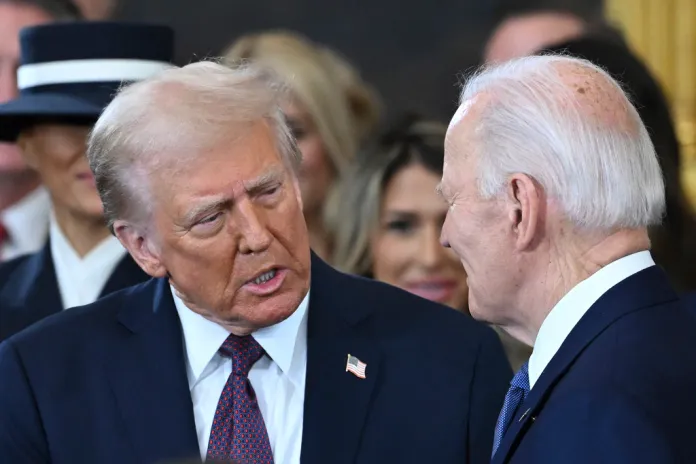Nippon Steel executive condemns Biden putting politics over security
A Nippon Steel executive, Takahiro Mori, criticized President Joe Biden for blocking the company’s purchase of U.S. Steel, describing the decision as politically motivated and unfair. Following this action taken on January 3, Nippon Steel filed a lawsuit against the U.S. government. Mori wrote an op-ed in the *Wall Street Journal*, arguing that the review process conducted by the Committee on Foreign investment in the United States (CFIUS) lacked due process and failed to engage meaningfully with the company. He claimed that Biden’s public opposition to the deal, following assurances to the United Steelworkers union, indicated the decision was more about politics than genuine national security concerns. Mori insisted that japan is a close ally of the U.S. and argued that allowing political influence over foreign acquisitions could harm national security and deter foreign investment. He expressed concern that this precedent could make potential investors uncertain about their treatment in the U.S. market. Nippon Steel had proposed acquiring U.S. Steel for $14.9 billion.
Nippon Steel executive condemns Biden putting politics over security
A Nippon Steel executive condemned President Joe Biden for blocking the company’s purchase of U.S. Steel.
After Biden blocked the purchase on Jan. 3, the company sued the U.S. government. In an op-ed for the Wall Street Journal, Takahiro Mori, Nippon Steel’s vice chairman and representative director, argued that the Committee on Foreign Investment in the United States’s review “failed to meet the most basic requirements of due process and fairness” and that Biden’s decision was a purely political one.
“During Mr. Biden’s re-election campaign, the leadership of the United Steelworkers union announced in February that the president had personally assured them that he had their backs as they opposed our deal,” Mori wrote. “He publicly announced his opposition to our partnership in March—before Cfius began its formal review—and received the USW’s endorsement days later.”
Biden said a White House committee of national security and trade experts determined that Nippon Steel’s purchase of U.S. Steel would create risks for both the supply chain and national security. Mori dismissed the national security concerns, complaining that the CFIUS “barely engaged with us.”
“We don’t believe there was any national security concern to begin with; Japan is one of America’s staunchest allies,” Mori wrote. “Cfius didn’t send us a single written comment on or serious question about our proposals before referring the transaction to the president.”
Mori argued that allowing electoral politics to dictate foreign acquisitions would endanger national security, hurting foreign investment.
“The U.S. has built a welcoming environment for foreign investment, but the world is watching this deal closely,” Mori wrote. “Major companies in allied nations want to invest in the U.S. and employ Americans. Now they wonder if they’ll be treated as partners or political pawns.”
Nippon Steel offered to acquire U.S. Steel for $14.9 billion. Biden blocked the deal during his lame-duck period, saying there was “credible evidence” that it could threaten national security.
“Today’s action reflects my unflinching commitment to utilize all authorities available to me as President to defend U.S. national security, including by ensuring that American companies continue to play a central role in sectors that are critical for our national security,” Biden said in a Jan. 3 statement.
The deal was greeted with heavy backlash when it was announced in 2023, particularly in the Rust Belt, where U.S. Steel has been a fixture since its formation in 1901.
Though Mori is hoping to work with the Trump administration on the deal, U.S. government opposition is likely to be a rare commonality between the two administrations. In a Dec. 2, 2024, Truth Social post, Trump vowed to block the deal.
“I am totally against the once great and powerful U.S. Steel being bought by a foreign company, in this case Nippon Steel of Japan,” he wrote. “Through a series of Tax Incentives and Tariffs, we will make U.S. Steel Strong and Great Again, and it will happen FAST! As President, I will block this deal from happening. Buyer Beware!!!”
With Trump’s opposition, it will be difficult for the deal to proceed. Nippon Steel’s primary hope is successful legal action.
The effect of the blocking of the deal is disputed. If no company acquires U.S. Steel, one estimate holds that up to 11,000 jobs in Pennsylvania would be eliminated and that it would cost U.S. Steel shareholders some $4 billion. U.S. Steel itself has signaled that it would be forced to abandon Pennsylvania without the Nippon Steel acquisition, though the USW and some analysts counter this by arguing its financials are in relatively good shape, the Pittsburgh Post-Gazette reported.
Lourenco Goncalves, the CEO of steelmaker Cleveland-Cliffs, reaffirmed his interest in acquiring U.S. Steel on Monday. As part of the new deal, Cleveland-Cliffs would become a subsidy of U.S. Steel, which would keep its name, and Pittsburgh would become the headquarters of the new company.
" Conservative News Daily does not always share or support the views and opinions expressed here; they are just those of the writer."




